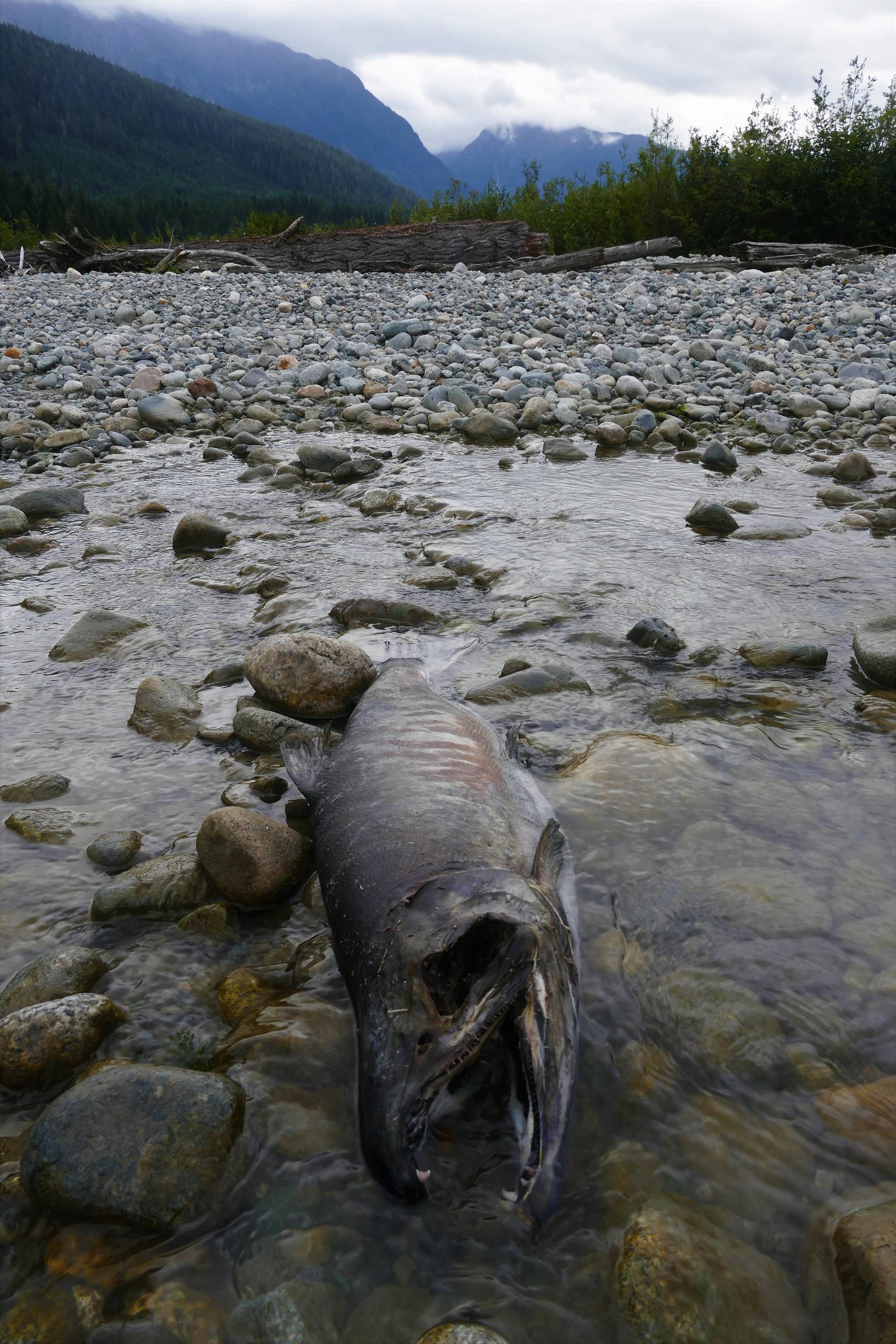Dozens of decomposing pink and chum salmon, their eyes plucked by birds, lay strewn in the shallows of a stream in southern Southeast Alaska. A few had been skinned by bears. Others had their egg sacs torn out — if a bear is well-fed, it will often just eat the choicest parts. Glaucous-winged gulls patrolled the stream, snatching eggs out of the water. Ravens watched from the boughs of Sitka Spruce trees. An occasional eagle wheeled by in the dusky evening.
I stood in the shallow current looking up at mountains wrapped in clouds. It was awe-inspiring to think that all over Alaska this scene was being replicated at this exact moment. I was about to continue up the stream when I looked down. A spawned out male pink salmon lay at my boots struggling to breathe. I knelt and studied it.
There appeared to be nothing special about the salmon. If anything, it was a little small compared to the other male pinks in the stream. Like the already dead, birds had plucked its eyes from its sockets. After surviving a gauntlet of predators, it had returned to its natal stream and squirted its milt into a redd. It had beaten 500 to one odds — maybe even more — to make it to this moment. The purpose of its life fulfilled, it had floated downstream and washed up on the gravel where it now lay dying an undignified death.
I hung around the salmon for another half hour. I considered bashing its skull in with a rock, but it didn’t seem right. The fish was still breathing when I walked off.
That night I sat above the stream unable to shake a subtle morbidity. I imagined the salmon had died by now, that moving water was slowly stripping away its flesh and its suffering was over. The salmon was a testament to the tenacity of life, fate and a gift I don’t appreciate nearly enough. I thought how our flesh, thoughts and emotions are only given to us on loan. That all we really leave behind once all that is stripped away is a blueprint for the perpetuation of future generations. I really could have used a bear encounter to get me out of my thoughts, but there was only the sound of moving water and salmon thrashing in the darkness.
Like many Alaskans, much of my life – from working on commercial fishing boats, to guiding bear viewing trips, to the food on my table — has been because of salmon. I’d killed thousands, often so quickly that I had no time to reflect on the individual animal I clubbed or shook out of a net. They have fueled my economy, existence and land. I’d given back nothing in return.
It’s easy to forget that salmon have vanished or been vastly depleted from much of their original habitat. It’s easy to believe that Alaska will somehow be exempt from our fish runs vanishing. It’s easy to not know what you have until its gone. The truth is that the future of Alaskan salmon is precarious at best.
In the morning I walked back to where I stood over the salmon the day before. I couldn’t decipher him from the dozens of other carcasses strewn across the shallows and gravel bars. I watched a few salmon thrash up a riffle before I headed back into the woods.
One small thing we can do for salmon, ourselves and future generations is to consider the Stand for Salmon ballot initiative. Protecting salmon habitat does not mean the end of other industries. It means working to assure that we don’t lose all the gifts salmon bestow upon us, including our multibillion-dollar fisheries that employ around 60,000 workers each year. I know I’ll be voting yes on Ballot Measure 1 on Nov. 6.
• Bjorn Dihle is a Juneau writer and columnist. He is the author of “Haunted Inside Passage: Ghosts, Legends and Mysteries of Southeast Alaska” and “Never Cry Halibut: and Other Alaska Fishing and Hunting Tales.” You can contact or follow him at facebook.com/BjornDihleauthor.

